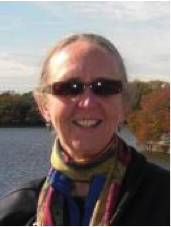Integrative health represented in key public health association
July 13, 2017
 by John Weeks, Publisher/Editor of The Integrator Blog News and Reports Complementary and alternative medicine got off to a shaky start with the public health community.
by John Weeks, Publisher/Editor of The Integrator Blog News and Reports Complementary and alternative medicine got off to a shaky start with the public health community.  Early surveys on use of alternative medicine seemed to point 180 degrees away from the typical public health constituency represented in the American Public Health Association (APHA). The portrait was of cash-paying, well-to-do, highly-educated women served by practitioners who favored concierge, cash practices over service to the underserved. It did not help that access to these medical alternatives were vociferously backed by Republicans, such as Utah’s Orrin Hatch and the right-wing former Indiana Congressman Dan Burton.
Early surveys on use of alternative medicine seemed to point 180 degrees away from the typical public health constituency represented in the American Public Health Association (APHA). The portrait was of cash-paying, well-to-do, highly-educated women served by practitioners who favored concierge, cash practices over service to the underserved. It did not help that access to these medical alternatives were vociferously backed by Republicans, such as Utah’s Orrin Hatch and the right-wing former Indiana Congressman Dan Burton.  Yet, a cadre of activists in the integrative health and medicine field started showing up for APHA meetings. They knew that Hispanic, Asian, Native American, Southern African American, and multiple immigrant populations remained connected to traditional medicine practices. They formed a special interest group that, three years ago, was recognized as the Integrative, Complementary and Traditional Medicine Section of APHA. Then last year, Elizabeth Sommers, PhD, LAc, MD, an acupuncturist, researcher, and public health activist, was elected to the 15-person Steering Committee of the APHA, which deals with policy and communication for the organization’s roughly 25 component sections. I recently caught up with Sommers, whose public health career began in women’s health in the 1970s. A decade later, she was a principal at the Pathways to Wellness community clinic in Boston, where she provided acupuncture services to underserved people, including grant-funded work for members of the HIV community. Sommers is now based at Boston Medical Center (BMC) in the Integrative Medicine and Health Disparities program, where she is an acupuncturist and researcher. BMC is the city’s safety net hospital. Here is an update from Sommers on how it is to be forging this new path connecting public health and integrative health and medicine: Integrative Practitioner: This is an elected position. Do you officially represent integrative, complementary, and traditional medicine then? Sommers: I am in my first year of a three-year term and am still learning. This intersectional council really tries to be a transdisciplinary practice. This is exciting. I am effectively a liaison to four APHA Component sections. The other three are the Chiropractic Health Care Section, Food and Nutrition Section, and Physical Activity Section. Integrative Practitioner: What is the feeling at APHA these days? Sommers: Our annual meeting in late October last year was a sort of a love-fest. It was almost euphoric. We set 10 to 12 key public health goals for what we thought would be the upcoming Clinton administration. Then, the next week came the election. Integrative Practitioner: What are the priorities now? Sommers: The APHA has set three public policy goals. The first is to save the Affordable Care Act. The second is to address climate change. The third is intervening with treatment and policy affecting the opioid crisis. I have gotten most involved in the third. There is an overarching section group on that. Integrative Practitioner: Have you had measurable impact? Sommers: We are working with the section group on the opioid priority to plan a plenary for the 2018 APHA Annual Meeting. I was able to suggest Josie Briggs [MD, the director of the NIH National Center for Complementary and Integrative Health] to be on the plenary panel. She’s pushed the Center toward pain and opioid topics, and into partnerships with the Veterans’ Administration and military on pain treatment. She’ll also give the Donna Feeley Memorial lecture to our APHA Section. Briggs will participate in the plenary panel along with other leaders from the CDC and SAMHSA. We also have a webinar planned on ways of addressing the opioid crisis that will include nonpharmacological means of pain management and strategies for detox and recovery. Integrative Practitioner: Do you have any specific messages to the integrative health and medicine community? Sommers: Be thinking of our natural interest in how we interact with climate change. Herbs need habitat to grow. We can’t be poisoning our crops. We can’t eat healthy with seafood if the oceans are dead. Look at sun exposure and ultra-violet rays. How can these shared interests with public health be drawn out? Integrative Practitioner: So, how is the reception, to have an acupuncturist and integrative health person, among that small group of 12-15 on the section council? Sommers: It think it’s gotten my colleagues’ attention. It’s kind of an even mix between those who seem a little unsure and those who pull me aside and say “I do yoga” or “I see an acupuncturist.” I’m really excited about being there.
Yet, a cadre of activists in the integrative health and medicine field started showing up for APHA meetings. They knew that Hispanic, Asian, Native American, Southern African American, and multiple immigrant populations remained connected to traditional medicine practices. They formed a special interest group that, three years ago, was recognized as the Integrative, Complementary and Traditional Medicine Section of APHA. Then last year, Elizabeth Sommers, PhD, LAc, MD, an acupuncturist, researcher, and public health activist, was elected to the 15-person Steering Committee of the APHA, which deals with policy and communication for the organization’s roughly 25 component sections. I recently caught up with Sommers, whose public health career began in women’s health in the 1970s. A decade later, she was a principal at the Pathways to Wellness community clinic in Boston, where she provided acupuncture services to underserved people, including grant-funded work for members of the HIV community. Sommers is now based at Boston Medical Center (BMC) in the Integrative Medicine and Health Disparities program, where she is an acupuncturist and researcher. BMC is the city’s safety net hospital. Here is an update from Sommers on how it is to be forging this new path connecting public health and integrative health and medicine: Integrative Practitioner: This is an elected position. Do you officially represent integrative, complementary, and traditional medicine then? Sommers: I am in my first year of a three-year term and am still learning. This intersectional council really tries to be a transdisciplinary practice. This is exciting. I am effectively a liaison to four APHA Component sections. The other three are the Chiropractic Health Care Section, Food and Nutrition Section, and Physical Activity Section. Integrative Practitioner: What is the feeling at APHA these days? Sommers: Our annual meeting in late October last year was a sort of a love-fest. It was almost euphoric. We set 10 to 12 key public health goals for what we thought would be the upcoming Clinton administration. Then, the next week came the election. Integrative Practitioner: What are the priorities now? Sommers: The APHA has set three public policy goals. The first is to save the Affordable Care Act. The second is to address climate change. The third is intervening with treatment and policy affecting the opioid crisis. I have gotten most involved in the third. There is an overarching section group on that. Integrative Practitioner: Have you had measurable impact? Sommers: We are working with the section group on the opioid priority to plan a plenary for the 2018 APHA Annual Meeting. I was able to suggest Josie Briggs [MD, the director of the NIH National Center for Complementary and Integrative Health] to be on the plenary panel. She’s pushed the Center toward pain and opioid topics, and into partnerships with the Veterans’ Administration and military on pain treatment. She’ll also give the Donna Feeley Memorial lecture to our APHA Section. Briggs will participate in the plenary panel along with other leaders from the CDC and SAMHSA. We also have a webinar planned on ways of addressing the opioid crisis that will include nonpharmacological means of pain management and strategies for detox and recovery. Integrative Practitioner: Do you have any specific messages to the integrative health and medicine community? Sommers: Be thinking of our natural interest in how we interact with climate change. Herbs need habitat to grow. We can’t be poisoning our crops. We can’t eat healthy with seafood if the oceans are dead. Look at sun exposure and ultra-violet rays. How can these shared interests with public health be drawn out? Integrative Practitioner: So, how is the reception, to have an acupuncturist and integrative health person, among that small group of 12-15 on the section council? Sommers: It think it’s gotten my colleagues’ attention. It’s kind of an even mix between those who seem a little unsure and those who pull me aside and say “I do yoga” or “I see an acupuncturist.” I’m really excited about being there.



















SHARE